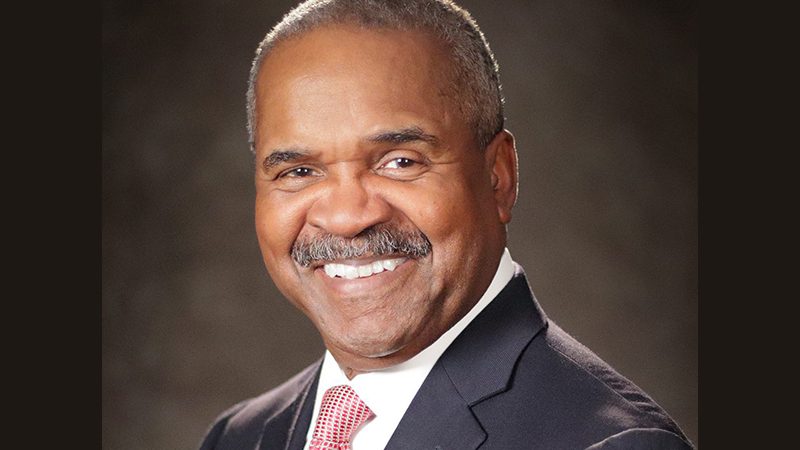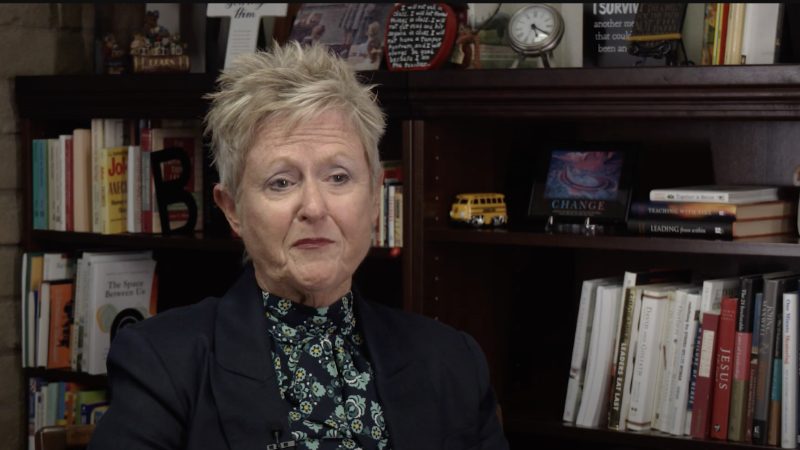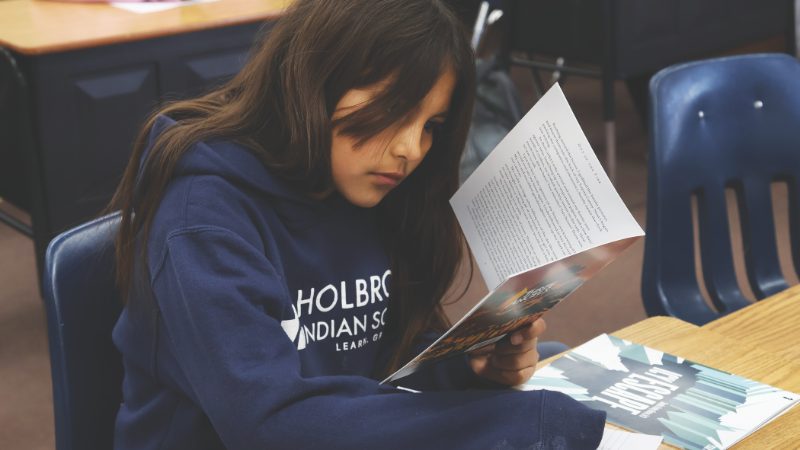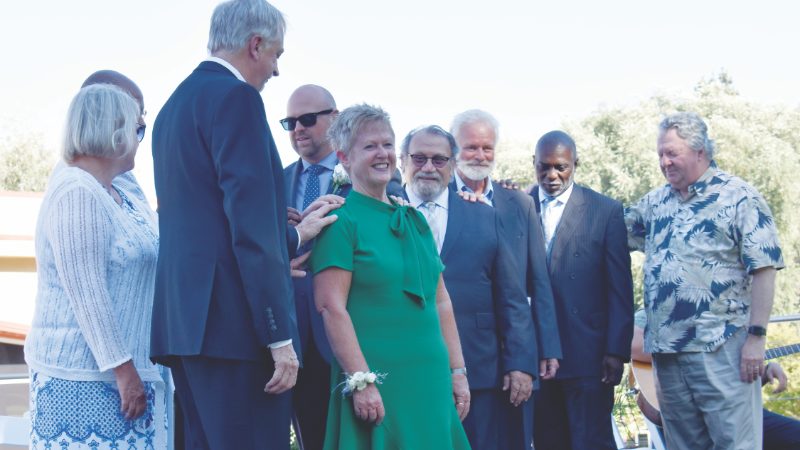The closest thing to a “family business” in my family is being a teacher. My dad taught science and math and was a small school principal. His parents were both teachers, and so was his sister. (My dad’s uncle was a pioneer teacher in one of the first Adventist schools in western Canada.) My first job for the church was as an MV Taskforce volunteer teaching elementary Bible at Okanagan Academy in Kelowna, British Columbia. In my life, I’ve had the opportunity to teach Bible and religion classes from fourth grade through college.

I married an English teacher. (Full disclosure—she has taught K through college; I think what was she liked best was teaching the young ones.) Her mother was an English teacher. Her grandmother taught English and other subjects as well. My daughter is an English teacher. My sister is a teacher. (What do you think they talk about when we are together?)
I want to speak tribute today to four of my teachers—three English teachers and one Bible teacher. These four people are each among the most influential in my life. And they were teachers! I’ve had my own “composition of teachers” who shaped my life and career.

Topping the list is my ninth- and tenth-grade English teacher at Andrews Academy, Miss Edith Davis. It was Miss Davis who was the first person who really encouraged me to write. “Encouraged” is too weak a word. She nudged, prompted, pushed, exhorted, urged, propelled, coaxed, insisted, forced, compelled, pressured, and drove me to write. “Words create worlds,” she would say. “If you really want to see something change, the best way to do it is to find great words to describe the changes you seek.”
Words create worlds. That was her watch phrase. Edith Davis was a constructionist—she believed that through Good English Prose you could engage the world in a way that would challenge the status quo and bring about change.
I was just 14 when Miss Davis saw in me something that no one else—including me—had seen. “Write, Raymond, write,” she would say. And even though I was a kid, she was a fierce editor. Miss Davis awakened my interest and talent in writing, journalism, and communication. We became friends and kept in touch across many, many years until her death in 2013.

Miss Davis had a favorite text that summarized her world view: “Whatsoever things are true, whatsoever things are honest, whatsoever things are just, whatsoever things are pure, whatsoever things are lovely, whatsoever things are of good report; if there be any virtue, and if there be any praise, think on these things. " (Philippians 4:8, KJV).
No one in my life has had a more enduring impact on my life, career, and calling than Miss Davis.
These teachers saw the potential in my life, pushed me to pay attention, to dig deeper, to go beyond the surface and find the supporting concepts and ideas that mattered.

There was an earlier teacher—also an English teacher—who had a major role in my development as a communicator. Miss Ruth Finck was my seventh- and eighth-grade English teacher. She taught us grammar (which I learned poorly), but what she loved was to explore and celebrate ideas.
In an age when the church seemed frozen and fearful of the changes that were shaking society in the 60s, Miss Finck constantly encouraged us to focus on the possibilities that change could bring. When I was 12 and 13, she taught me that the questions I had were important and not too scary. She was not afraid to have what I considered very serious conversations about the Big Things in life.
If Miss Davis proclaimed, “Words create worlds,” Miss Finck was all about creating great questions—and not being afraid to ask them or of the conversations they created.
She was the first teacher I had who showed me the benefits of being a part of a community whose culture embraced uncertainty—even mistakes—and welcomed the learning derived from them. “IRL” we call it now—In Real Life. Miss Finck believed that the questions we asked were the beginning of change that happened IRL.
I don’t remember a text that she loved, but I do know a text I learned in those years. It’s the one that says that God’s blessings are “new every morning” (Lamentations 3:23). From Miss Finck I began to learn that growth is constant and that inquiry and change happen at the same moment.

My sophomore year of academy, I had a living saint as my Bible teacher—Elder John Kerbs. I don’t know if I would have made it through adolescence without him.
Sometimes I think the biggest challenge in working with young people is that they pursue permanent solutions to temporary problems. They do things that they can’t undo. They engage in behaviors that become impossible to sustain without damage to themselves and other people.
In my sophomore year, when several of the individuals in my class—including me—were barreling down a pathway that would have resulted in sure disaster, Saint John Kerbs stepped up. He became a real savior and mentor for us. He showed us a better way. His way was always the way of Jesus—not a judgmental Jesus but the positive and accepting one. Elder Kerbs pushed us to see and appreciate the best parts of our lives as ways to address the things that were painful—and at 15, there is plenty that is painful.

He called on us to support each other and to be true to our highest values. Mostly, he encouraged us to lift our eyes past the moment to the future. “Remember,” he would say, quoting Philippians 4:13, “we can do all things through Christ who strengthens us.”
Six years after he was my sophomore Bible teacher, I had the chance to work alongside John Kerbs when he was teaching Bible at PUC Prep and I was the youth pastor for Angwin Youth at the Pacific Union College church. He was one of our sponsors, and we spent many hours together. That’s when I realized he really was a saint—and that not only had he been right, but it was his faithfulness and optimism that had saved me when I most needed saving.

In my senior year, Joyce Connor was our English teacher. She didn’t focus on what I was writing, although she would ruthlessly mark up an essay or poem or song lyric that I happened to be working on. Building on what other members of my composition of teachers had done, she made me pay attention to what I was reading—not only in her classes but in my personal reading as well.
She got me signed up for public library cards—at the local public library and the university—and insisted that I use them. She loaned me books from her own collection. She taught me to love poetry and fiction and drama. On one occasion, Joyce and her husband invited my girlfriend and me to go with them on a “double date” to see a play at Fresno State University. I’d never seen a live stage play before—stagecraft was electrifying for me! It was the beginning of a lifelong hobby and passion.

When she saw how much I liked theater, she encouraged me to organize and direct a play on our campus—my first turn as a director/producer, which is what I’ve spent most of my life doing.
Joyce Connor thought in poetic terms, and she was just as likely to quote Emily Dickinson or Robert Frost to you as a Bible text to make a moral point. She encouraged me to see the world as a mystery unfolding, a poem being written, a drama played out on a grand stage.

I was reminded of how important that was to her a few years ago when I posted the Langston Hughes poem, “Dreams,” on my Facebook page. It says:
Hold fast to dreams
For if dreams die
Life is a broken-winged bird
That cannot fly.
Hold fast to dreams
For when dreams go
Life is a barren field
Frozen with snow.
Mrs. Connor, who I interacted with frequently on social media until her death in 2021, send me a private message that said, “I think I was the person who first taught you that poem.” And she was.

These teachers saw the potential in my life, pushed me to pay attention, to dig deeper, to go beyond the surface and find the supporting concepts and ideas that mattered.
They showed me how to set audacious goals and pursue them. They didn’t care if I failed, only if I didn’t try. They insisted that I think about where ideas would take me—and they used examples from literature and Scripture of people who have succeeded, failed, or gone in totally different directions because they were either faithful to their ideas or had allowed them to be compromised.
I would not be the person I am today—nor would I have enjoyed a decades-long career as a writer and communicator—had they not been my personal composition of teachers. I wouldn’t be writing this tribute. And I am grateful.
_____________________________

Ray Tetz is the director of communication and community engagement for the Pacific Union Conference and the publisher of the Recorder.
Cuatro maestros que transformaron mi vida
Por Ray Tetz
Lo más parecido a un «negocio familiar» en mi familia es ser maestro. Mi papá enseñaba ciencia y matemáticas y era director de una escuela pequeña. Sus padres eran maestros, al igual que su hermana (el tío de mi padre fue maestro pionero en una de las primeras escuelas adventistas en el oeste de Canadá). Mi primer trabajo para la iglesia fue como voluntario de MV Taskforce enseñando Biblia elemental en la Okanagan Academy en Kelowna, British Columbia. En mi vida, he tenido la oportunidad de enseñar clases de Biblia y religión desde cuarto grado hasta college.

Me casé con una maestra de inglés (revelación completa: ella ha enseñado desde Kinder hasta universidad; creo que lo que más le gustaba era enseñar a los más pequeños). Su madre era profesora de inglés. Su abuela también enseñaba inglés y otras materias. Mi hija es profesora de inglés. Mi hermana es maestra (¿de qué crees que hablan cuando estamos juntos?)
Quiero rendir homenaje a cuatro de mis maestros: tres maestras de inglés y un maestro de Biblia. Esas cuatro personas se encuentran entre las más influyentes en mi vida. ¡Y eran maestros! He tenido mi propia «banda de maestros» que dieron forma a mi vida y a mi carrera.

Encabezando la lista está mi maestra de inglés de noveno y décimo grado en Andrews Academy, la señorita Edith Davis. Fue la señorita Davis la primera persona que realmente me animó a escribir. «Animar» es una palabra demasiado débil. Me alentó, me motivó, me exhortó, me instó, me animó, me persuadió, insistió, me obligó a presionarme y me impulsó a escribir. «Las palabras crean mundos», decía. «Si realmente quieres ver que algo cambie, la mejor manera de hacerlo es encontrar buenas palabras para describir los cambios que buscas».
Las palabras crean mundos. Esa era su consigna. Edith Davis era una construccionista: creía que a través de la buena prosa se podía involucrar al mundo de una manera que desafiase el statu quo y provocase un cambio.
Tenía solo 14 años cuando la señorita Davis vio en mí algo que nadie más veía, incluyendo yo mismo. «Escribe, Raymond, escribe», me decía. Aunque yo era un niño era una editora feroz. La señorita Davis despertó mi interés y talento por la escritura, el periodismo y la comunicación. Nos hicimos amigos y nos mantuvimos en contacto durante muchos, muchos años hasta su muerte en 2013.

La señorita Davis tenía un texto favorito que resumía su visión del mundo: «Todo lo que es verdadero, todo lo que es honesto, todo lo que es justo, todo lo que es puro, todo lo que es amable, todo lo que es de buen nombre; si hay alguna virtud y si hay alguna alabanza, piensa en esas cosas» (Filipenses 4:8).
Nadie ha tenido un impacto más duradero en mi vida, carrera y vocación como la señorita Davis.
Esos maestros vieron el potencial en mi vida, me hicieron prestar atención, a profundizar más, a ir más allá de la superficie y encontrar los conceptos e ideas de apoyo que importaban.

Hubo una maestra anterior, también maestra de inglés, que tuvo un papel importante en mi desarrollo como escritor. La señorita Ruth Finck fue mi maestra de inglés en séptimo y octavo grado. Nos enseñaba gramática (que aprendí mal), pero lo que le encantaba era explorar y celebrar las ideas.
En una época en la que la iglesia parecía congelada y temerosa de los cambios que sacudían a la sociedad en los años 60, la señorita Finck nos animaba constantemente a centrarnos en las posibilidades que el cambio podía producir. Cuando tenía 12 y 13 años me enseñó que las preguntas que tenía eran importantes y no demasiado aterradoras. No tenía miedo de tener lo que yo consideraba conversaciones muy serias sobre los grandes temas de la vida.
Si la señorita Davis proclamaba «las palabras crean mundos», la señorita Finck se dedicaba a crear grandes preguntas y a no temer hacerlas o de las conversaciones que producían.
Fue la primera maestra que me mostró los beneficios de ser parte de una comunidad cuya cultura abrazaba la incertidumbre, incluso los errores, y daba la bienvenida al aprendizaje derivado de ellos. La señorita Finck creía que las preguntas que hacíamos eran el comienzo de la transformación que se producía en la vida real.
No recuerdo un texto que le gustase, pero sí conozco un texto que aprendí en esos años. Es el que dice que las bendiciones de Dios son «nuevas cada mañana» (Lamentaciones 3:23). De la señorita Finck comencé a aprender que el crecimiento es constante y que la investigación y el cambio ocurren al mismo tiempo.

En mi segundo año de high school, tuve a un santo en vida como maestro de Biblia: el pastor John Kerbs. No sé si hubiese sobrevivido la adolescencia sin él.
A veces pienso que el mayor desafío de trabajar con jóvenes es que buscan soluciones permanentes a problemas temporales. Hacen cosas que no pueden deshacer. Se involucran en comportamientos que se tornan imposibles de sostener sin dañarse a sí mismos y a otras personas.
En mi segundo año, con otros condiscípulos, estábamos yendo por un camino que hubiese llevado a un desastre seguro, pero San John Kerbs tomó un paso significativo. Se convirtió en un verdadero salvador y mentor para nosotros. Nos mostró una forma mejor. Su forma siempre era la forma de Jesús, no un Jesús que juzga, sino positivo y tolerante. El pastor Kerbs nos obligó a ver y apreciar las mejores partes de nuestra vida y formas de abordar las cosas que eran dolorosas y, a los 15 años, hay muchas cosas que son dolorosas.

Nos pidió que nos apoyásemos mutuamente y que fuésemos fieles a nuestros valores más elevados. Sobre todo, nos animó a elevar la mirada más allá del momento hacia el futuro. «Recuerden», decía, citando Filipenses 4:13, «que todo lo podemos en Cristo que nos fortalece».
Seis años después de que él fuese mi segundo maestro de Biblia, tuve la oportunidad de trabajar con John Kerbs cuando estaba enseñando Biblia en PUC Prep y yo era pastor de jóvenes de Angwin Youth en la iglesia de Pacific Union College. Era uno de nuestros patrocinadores y pasábamos muchas horas juntos. Fue entonces que me di cuenta de que realmente era un santo y que no solo tenía razón, sino que era su fidelidad y optimismo lo que me había salvado cuando más necesitaba ser salvado.

En mi último año, Joyce Connor fue nuestra maestra de inglés. No se centraba en lo que yo estaba escribiendo, aunque tachaba sin piedad el ensayo, poema o la letra de una canción que yo estuviese escribiendo. Basándose en lo que habían hecho otros miembros de mi banda de maestros, me hizo prestar atención a lo que yo estaba leyendo, no solo en sus clases, sino también en mi lectura personal.
Me inscribió para obtener tarjetas de la biblioteca pública y de la universidad, e insistió en que las usase. Me prestó libros de su propia colección. Me enseñó a amar la poesía, la ficción y el teatro. En una ocasión Joyce y su esposo nos invitaron a mi novia y a mí a ir con ellos en una «cita doble» para ver una obra de teatro en Fresno State University. Nunca antes había visto una obra de teatro en vivo, ¡fue algo electrizante para mí! Fue el comienzo de un pasatiempo y una pasión de toda mi vida.

Cuando vio lo mucho que me gustaba el teatro me animó a organizar y dirigir una obra de teatro en nuestro campus, mi primer turno como director/productor, que es a lo que he dedicado la mayor parte de mi vida.
Joyce Connor pensaba en términos poéticos y era tan probable que te citase tanto a Emily Dickinson o a Robert Frost como a un texto bíblico para hacer un punto moral. Me animó a ver el mundo como un misterio que se desarrolla, un poema que se escribe, un drama que se expone en un gran escenario.

Me acordé de lo importante que era eso para ella hace unos años cuando publiqué el poema de Langston Hughes, «Sueños», en mi página de Facebook. El poema reza:
Aférrate a los sueños
Porque si los sueños mueren
La vida es un pájaro de alas rotas
Que no puede volar.
Aférrate a los sueños
Porque cuando los sueños se van
La vida es un campo estéril
Congelado por la nieve.
La Sra. Connor, con quien interactué con frecuencia en las redes sociales hasta su muerte en 2021, me envió un mensaje privado que decía: «Creo que fui la persona que te enseñó ese poema por primera vez». Y así mismo fue.

Esos maestros vieron el potencial en mi vida, me instaron a prestar atención, a profundizar más, a ir más allá de la superficie y encontrar los conceptos e ideas de apoyo que importaban.
Me enseñaron a fijarme metas audaces y a alcanzarlas. No les importaba si fallaba, solo si no lo intentaba. Insistieron en que pensase a dónde me llevarían las ideas y usaron ejemplos de la literatura y de las Escrituras de personas que han tenido éxito, han fracasado o han ido en direcciones totalmente diferentes porque fueron fieles a sus ideas o permitieron avenirse.
No sería la persona que soy, ni hubiese disfrutado de una carrera de décadas como escritor y comunicador, si no hubiesen sido por mi banda personal de maestros. No estaría escribiendo este homenaje. Les estoy muy agradecido.
_____________________________

Ray Tetz es director de comunicación y participación comunitaria de la Pacific Union Conference.






